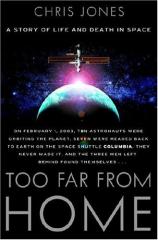Too Far From Home: A Story of Life and Death in Space
Review
Too Far From Home: A Story of Life and Death in Space
I
remember exactly how I heard on February 1, 2003 that the Columbia
space shuttle had exploded shortly after re-entry and only seconds
before what should have been a routine safe landing. My clock radio
snapped on with the CBC hourly news and the first words I heard
that terrible morning were: "This just in: the space shuttle
Columbia has been lost...all seven crew members are presumed
dead."
As further details and confirmation of the disaster filtered in
over that day's airwaves and in every newspaper on the planet, it
was all too apparent that this second major shuttle tragedy in less
than two decades could well mean the end of NASA's manned orbital
program and the International Space Station. As for future
prospects of deeper space exploration, the possibilities had
suddenly diminished to a faint dream.
But I also admit that, like millions of others shocked and saddened
at the Columbia's demise, I -- unlike TOO FAR FROM HOME author
Chris Jones -- never gave a thought to the remainder of the
ill-fated Expedition Six mission crew left aboard the orbiting
Station. Little by little, a few snippets of information filtered
into the media about the remarkable two Americans (Don Pettit and
Ken Bowersox) and one Russian (Nikolai Budarin) who stuck it out,
marooned in space for months until a deeply humbled America turned
to its Russian arch-rival for rescue help.
Jones, an award-winning Canadian journalist, took up this
fascinating story of the crew left behind with a passion that
brings every detail --- from the gross and mundane to the truly
transcendent --- into vivid exposure. His agile, cheeky prose,
along with often irreverent reportage and commentary, hit you like
a high-octane action-adventure movie script. Yet he manages to
maintain a precarious balance between the emotional extremes of an
unprecedented human endeavour and the quiet moments of recollection
and repose needed to reveal memorable real-life profiles of three
very different astronauts and their interwoven ways of coping with
trauma and challenge.
Perhaps it's almost too clichéd to suggest that Jones
developed a fly-on-the-wall kind of perspective, but there's no
denying he really does take the reader fully into the space station
and descriptively lives every moment encountered by those humans
privileged (and deserving) enough to have shared such an
incomparable experience. Amid their moments of confusion, fear,
deep grief, loneliness, inertia, claustrophobia, irritation and
just plain fatigue, Bowersox, Pettit and Budarin repeatedly
transcend their circumstances to experience personal fulfillment,
scientific accomplishment and a shared wonder at the beauty of the
cosmos unfolding around their fragile "tin can" home in
space.
When the three do come home again, it's not without genuine regret
for the almost-ethereal existence of months spent in their
artificial environment, as well as paralyzing fear (well founded,
it turned out) at the prospect of a hard-earth landing aboard a
cramped Soyuz capsule. Their survival --- a miracle as enormous as
the Columbia's loss was tragic --- gives Jones's story the happy
ending it deserves.
But it is the journey itself --- a journey that often seemed to be
going nowhere at breakneck speed while politicians and bureaucrats
wrangled down below --- that TOO FAR FROM HOME recounts so well. I
barely was able to put the book down.
Reviewed by Pauline Finch (paulinefinch@rogers.com) on January 23, 2011
Too Far From Home: A Story of Life and Death in Space
- Publication Date: March 6, 2007
- Genres: Nonfiction, Science
- Hardcover: 304 pages
- Publisher: Doubleday
- ISBN-10: 0385514654
- ISBN-13: 9780385514651




